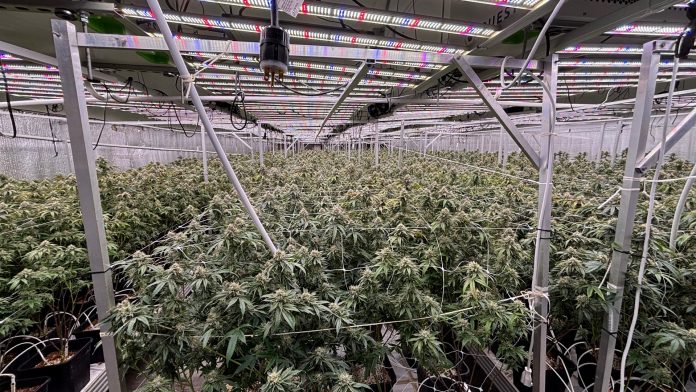More than 300 National Guard troops initially tasked with aiding law enforcement in the Los Angeles protests and subsequent unrest assisted federal agents during the week of June 15 in a large-scale raid targeting three suspected illegal marijuana farms in Thermal, a desert community in Riverside County, California. The Drug Enforcement Administration (DEA) led the operation, which spanned approximately 787 acres in the Coachella Valley.
The DEA cited the scale, topography and extreme heat, with temperatures reaching 112 degrees, as reasons for requesting assistance from multiple federal agencies.
The task force included roughly 500 personnel from the DEA, Immigration and Customs Enforcement (ICE), Customs and Border Protection, the FBI, ATF, U.S. Marshals Service, the Internal Revenue Service and the National Guard. Agents arrested between 70 and 75 immigrants without legal status, and one U.S. citizen was accused of obstructing law enforcement. Two men were found padlocked inside a trailer at one of the sites, a DEA spokesperson told The Los Angeles Times.
How is this tied to Trump’s National Guard order for Los Angeles?
President Donald Trump originally federalized the National Guard units deployed to Riverside County to respond to protests in Los Angeles over immigration enforcement. In early June, Trump ordered about 4,000 National Guard troops and 700 Marines to assist federal officers in Los Angeles. The 9th U.S. Circuit Court of Appeals upheld Trump’s authority to federalize the Guard for that mission, citing violence in Los Angeles as sufficient justification.
Unbiased. Straight Facts.TM
Less than 20% of federally deployed National Guard and Marine troops assigned to Los Angeles were operating inside the city, according to state court filings.

However, California officials argue that extending the Guard’s role to operations far from Los Angeles exceeds Trump’s authority. In a federal court filing cited by The Los Angeles Times, California Attorney General Rob Bonta’s office stated that the marijuana farm raids were not related to protecting federal property or personnel in Los Angeles, and questioned whether the president’s order remains legally valid, given the changed circumstances.
What legal issues are raised by the expanded deployment?
The dispute centers on whether Trump’s extended use of the National Guard violates the Posse Comitatus Act, which restricts the use of military forces for domestic law enforcement without congressional approval. Bonta’s office asked the court to review whether federalized troops can operate in areas where no violence or protests are occurring. Defense Department documents indicate that the deployment could last 60 days or longer, at the discretion of the secretary of defense.
Justice Department lawyers counter that ongoing unrest in Los Angeles still necessitates Guard involvement across federal operations, including immigration enforcement actions like the marijuana farm raid.
The legal battle over Trump’s authority to deploy military forces domestically remains unresolved as the case moves forward in federal court.
source: san.com
